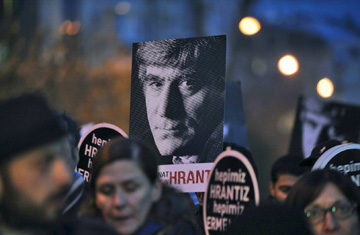
Partial justice? Remembering Dink on Jan. 17
In 1916, Henry Morgenthau Sr., American ambassador to the Ottoman Empire, resigned. His superiors' demand that he maintain cordial relations with Turkish Islamist zealots and ethnic nationalists as they massacred the Armenian Christian minority disgusted him. "I found intolerable my further daily association with men who ... were still reeking with the blood of nearly a million human beings."
The perpetrators got away with it, as they almost invariably do. When Turkey found itself on the losing side of World War I, the victorious allied armies held a few war-crimes trials. But more pressing matters soon distracted fickle statesmen, and sinister men noticed how quickly the world's attention wandered. "Who now remembers the Armenians?" Adolf Hitler is said to have asked before beginning his genocides.
In Turkey, it is still a criminal offense to remember. The state prosecuted the Armenian-Turkish journalist Hrant Dink three times for "insulting Turkishness" by refusing to airbrush the historical record. The courts' penalty of a suspended prison sentence was less severe than the punishment of a Turkish fanatic who assassinated Dink in 2007 and cried, "I shot the infidel" as he fled the scene. On Jan. 17, a Turkish court sentenced the man to life in prison.
Everyone who believes in freedom of speech should honor Dink's memory by standing alongside all the other brave Turkish novelists, artists and historians who have suffered for trying to tell the truth about the past. Rather than offer solidarity, however, France, the land of Voltaire, has revived an old proposal to ape Turkish authoritarianism. A bill now before the French Senate would make it illegal to deny the Armenian genocide. Those who repeat the Turkish government's propaganda that no mass extermination took place face fines of $57,500 and a year in prison.
A desperate President Nicolas Sarkozy has cynical reasons for promoting censorship in an election year. France has an Armenian minority, whose support he craves. By confronting the Turks, he can woo conservative voters tempted to abandon him for the far-right National Front.
That it is wrong to criminalize arguments — even terrible, self-serving or just plain stupid arguments — does not occur to members of the French elite. Nor do they reflect that if they cannot defeat Holocaust deniers in open debate without the assistance of the gendarmerie, then they have no business being in public life in the first place.
Their counterparts across the continent are equally willing to call the cops. The European Convention on Human Rights is meant to guarantee freedom of expression. But somehow it never does. France, Germany, Austria, Belgium, the Czech Republic, Lithuania, Romania, Poland and Slovakia all ban Holocaust denial. In France, privacy law prevents the public from finding out about the sex lives and corruptions of their politicians. The enormous costs of the English libel law (140 times the European average), its huge biases (the burden of proof is on the defendant) and its worldwide reach led the U.N. to portray my country as a global pariah. England now discourages "critical media reporting on matters of serious public interest," it said, "adversely affecting the ability of scholars and journalists to publish their work."
At heart, European judges and politicians have an aristocratic fear that if they grant the masses unrestricted debate, mobs will embrace revolution, racism or fascism. They do not believe that bad arguments can be defeated by better ones in a free society. They must ban argument in the first place. The rise of the French National Front is proof enough that censorship has rebounded on itself and turned ugly politicians into free-speech martyrs.
I don't think I am pushing it too far when I say that elite suspicion of European electorates lies at the heart of the euro crisis. Deceitful European leaders pretended that currency union would not lead to debt union because they knew that their populations would never embrace the "European ideal" if they told them it meant paying their taxes to bail out others.
The best outsiders look on with polite contempt. Dink, for one, was astonished by Europe's willingness to abandon its liberal traditions and follow Turkish repression. If this bill became law, he said when the proposal was mooted before his murder, "I will be among the first to head for France and break the law. Then we can watch both the Turkish Republic and the French Republic race against each other to condemn me." If Dink did not want the French to censor after all he had suffered, why should anyone else?
Cohen's You Can't Read This Book: Censorship in an Age of Freedom was released on Jan. 19.
